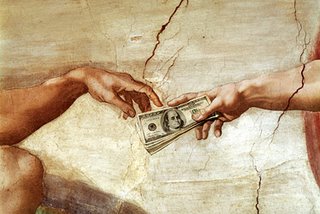
This week, I am thinking about the Second of the Beatitudes of Jesus in Matthew 5 - Blessed are the brokenhearted, those who mourn, those who weep.
If I am honest with myself, there are parts of my life that feel as if they are a persistent place for weeping. Little corners, dark places where we would rather not spend much time. The ways in which I let my wife and children down, where I fall short. More profoundly, when a child is deathly ill, or a parent is close to death, or a friendship withers and dies, these dark little corners seem to grow, and nearly engulf the rest of our lives. And the darkness is cold and unpleasant. It is too quiet in the dark, we feel threatened by the sound of our own breathing.
When we have family or close friends who suffer debilitative illness, or an early death, or deep and lasting pain, it can seem dark for days, or weeks, or years. Blessed are those who mourn?
Strangely, this deep sadness, loss, and our broken hearts can coexist in the midst of an otherwise "normal" life. Matthew scholar Dale Bruner comments in this book that mourning and sadness often are "a state that can as easily coexist with an outwardly happy life, as do all the other normal contradictions of living."
Sadness and mourning are inherent in our culture. Depressive disorders affect approximately 18.8 million American adults or about 9.5% of the U.S. population age 18 and older in a given year. Everyone, will at some time in their life be affected by depression -- their own or someone else's. Pre-schoolers are the fastest-growing market for antidepressants. At least four percent of preschoolers -- over a million -- are clinically depressed. The rate of increase of depression among children is an astounding 23%. About 54% of people believe depression is a personal weakness, and 41% of depressed women are too embarrassed to seek help. Sadly, 80% of depressed people are not currently having any treatment.
What is happening in our society, and to us? Why are we so wealthy, so "blessed", and yet so poor inside? Perhaps our sadness, our sense of sadness is related to how "blessed" we are. We have so much, that we need God so little. And so, perhaps we are all, together, in so many ways, broken hearted. And only God can come to us, and heal our broken hearts. And here again, Dale Bruner offers the thought that the first Beatitude (of being poor in spirit) "presses into" the second, where poverty of spirit descends into mourning - which creates faith in the very longing about our inability to believe." The second of the Beatitudes actually longs for the faith to believe. We mourn, because we do not believe. And yet, we want to believe.
Bruner tells us that... "in deep sadness human beings are in God's hands more than at any other time" .
Jesus lends his authority to the perception that it is those for whom sadness is deep that God is real! Jesus puts himself on the side of the outsider.
In Isaiah 61:1-2, we are reminded that, in the midst of our suffering, God promises to "bind up the brokenhearted".
The gospel is for us. We will be comforted.



